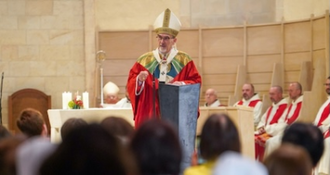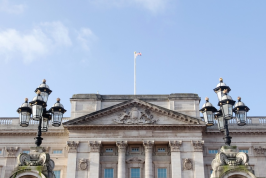Cardinal Pizzabella: Homily for World Day of Migrants 2025

Source: Latin Patriarchate of Jerusalem
Cardinal Pierbattista Pizzabella, Latin Patriarch of Jerusalem gave the following homily for World Day of Migrants 2025 at the Notre Dame of Jerusalem Centre.
Dear brothers and sisters,
Dearest Father Matthew,
may the Lord give you peace!
I am glad to be able to meet you on this important diocesan occasion. Indeed, the celebration of Migrant's Day is an opportunity for us to reflect, pray and give thanks. Reflect on the current situation of tens of thousands of people living among us. To place ourselves in your listening, giving voice to your expectations, fears, difficulties, but also to your joys and determination. To pray for you and with you and thus continue to build together our ecclesial community of the Holy Land. To thank the Lord for your presence, for your witness of authentic, solid and determined faith, and to thank those among you, religious men, women religious and volunteers who spend their lives to support, help and make this portion of the Church of the Holy Land grow.
I would like to pause on two significant expressions in today's gospel: "having a name" and "seeing". It has always struck me in this passage that it is only the poor man who has a name, while the rich man, presumably with some authority in his society, is nameless. To have a name means to have an identity, to have a history, a face, a family, to be part of a community. In short, it means being there for someone. In the Bible, from the very first book of Genesis, creation is formed when God gives it a name. The great characters of the Bible receive a new name when God entrusts them with a new mission, which gives them a new identity, from Abraham to Simon Peter.
The other expression is seeing. It also strikes me in today's gospel that Lazarus stands outside the rich man's door, but the rich man is unable to see him. He did not exist for him, yet he stood at his door. It is indeed true that we see not with our eyes but with our hearts. Our eyes see according to what dwells in our heart. The rich man's heart was bent on his possessions and his life, focused on himself and that's all, that he became incapable of seeing what was around him. The rich man was not being asked to give up everything he had, but only to have mercy, to step out of the circle of his little world for a little while. He was only being asked for a glance. But his heart, so full of itself, had no room for anything else.
This is a reality that happens not only in the Gospel unfortunately. It also happens among us often, that we are unable to see what is next to our door, that we are unable to see not only the need but simply the lives of those around us.
We see it throughout the world, where millions of people are forced to leave their homes, families, and countries to seek better opportunities for themselves and their loved ones, or simply to support the families who remain behind.
This happens to many families in the Holy Land who, because of conflict and its consequences, are compelled to leave to provide better opportunities for their children. I believe this is true for each of you as well - forced to leave in order to support your families, who often remain in your home country.
Migration is now a global phenomenon, present everywhere, requiring global responses, and one that the international community cannot ignore. History teaches us that building barriers is never the solution, as barriers represent fear, erase any promise of a future, and highlight our lack of vision. Yet vision is sorely needed, both here and throughout the world.
Migration is a reality that is rarely discussed here in the Holy Land, except during particularly dramatic moments; it remains hidden from most of the population. But no matter how much we try to keep it silent, it is evident to anyone who pays attention to what is happening around them. It concerns thousands of people who cannot remain invisible.
For many - too many - this reality, and each of you, has no name or face. You are not seen, as in today's Gospel. In your lives, there are often family and personal tragedies that do not make the news but leave a deep mark on your lives.
I think of the issue of deportations that continues to affect many families. Children and young people, born and raised here, are forced years later to leave for a homeland they never knew, becoming migrants in what should be their own country.
I think of the many who live among us without any legal guarantees, at risk of being forced to leave at any time, without means and without the possibility of obtaining them, forced - like the Lazarus of the Gospel - to live on crumbs.
I think of those who live in humiliating working conditions, and especially of the many children who do not have the opportunity to live like other families, with both parents, a home, and a peaceful environment; forced to leave for a foreign and not necessarily friendly country, to be separated for lack of means, always on the move, and living in fear of suddenly having to leave for an uncertain future.
I think of those who, in the past two years, have suffered in the most tragic way from the horrors of conflict - killed in this war: on October 7 in the kibbutzim, in recent months in northern Israel under rocket attacks from Lebanon, and lately in Tel Aviv during the war with Iran.
You often have no name and are not seen, as I said, yet you are part of the life of this Holy Land, contributing to its social and economic development, and sharing the same reality of violence, sometimes even to the point of death.
Our Church cannot influence these enormous processes, but it can listen to your voices and give a face and a name to each of you. This is our mission: to restore dignity and identity to people whom many would rather not see or meet, but who exist, are real, and await our response. For it is the Lord Himself, through you, who knocks at our door, turns His gaze toward us, and challenges our conscience. We cannot ignore this. We cannot remain silent.
On this occasion, I would like to thank the many in Israeli society who work to help and support the rights of the many Lazarus who live here, and also those who respectfully welcome them into their homes to work, treating them with dignity.
Finally, I thank the Vicariate for Migrants, Father Matthew Coutino, and all the staff, both religious and lay, who strive every day to be the voice and arm of the Church in this pastoral field and to remind the whole Church of the Holy Land of its duty to be, here and now, a free and clear voice of the Gospel of Lazarus: to give a name and a face to Christ who knocks at our door.
+Pierbattista


















